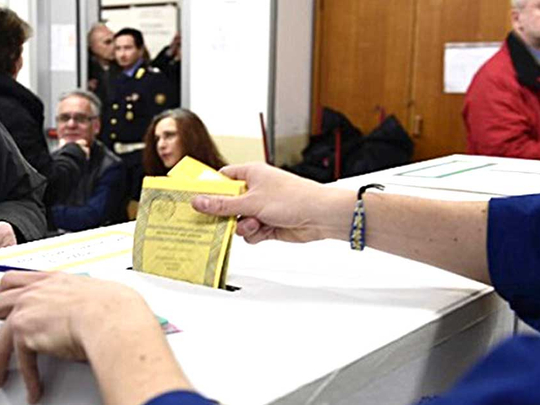
After the March 4 election indicated a strong desire for change and renewal of the Italian political class, the time has come for Italy to nominate a woman as prime minister for the first time in its history. More than half of Italian voters opted for anti-establishment parties, and regardless of the outcome of the fraught negotiations set to begin this week, electing Italy’s first-ever female prime minister would indisputably be a strategic choice. The appointment of a woman to Italy’s highest political office is clearly in the national interest, for three converging reasons. First, such a move would speak to the enthusiasm of voters who took to polling stations en masse to defeat the country’s traditional parties. While these citizens are united in their desire for a new government that breaks with the past, they are divided by the ideological and geographic differences that separate the parties they support.
Italy is mired in a political impasse that threatens to generate further discontent if it continues unabated. The country needs a uniting element to harness and maintain the enthusiasm of voters, regardless of which party wins the post of prime minister — and there is no better choice than elevating the first woman to lead Italy since the foundation of the republic in 1946. This could channel that disruptive enthusiasm into support for the new government, strengthening the credibility of Italy’s institutions at a time when they are under constant attack from anti-establishment forces.
Most importantly, there is no shortage of qualified candidates for the job. The newly elected legislature boasts the highest number of elected female representatives in Italian history, and there are several high-profile women within each of Italy’s main parties who could easily stake a claim to the position of prime minister. There are even more qualified women across the Italian private sector and public administration, from the justice system to the national security apparatus.
With a woman at the helm, Italy could place itself at the forefront of the fight for gender equality and the battle against gender violence and abuse. The #MeToo movement in the United States, which was sparked by the Harvey Weinstein case and saw many women come forward to publicly denounce the abuse and violence they’ve experienced in their lives, provides an extraordinary opportunity for all advanced democracies. Institutions in democratic countries must respond by proving to women that they will guarantee that their rights are upheld. What better way for Italy to prove that than by shattering a 71-year-old taboo on the appointment of a woman to the highest political office in the land?
Several studies conducted by researchers in Italy and around the world have demonstrated that delaying gender parity has serious consequences for economic growth. Electing Italy’s first-ever female prime minister would be a watershed moment, spurring a push for a greater role for women across Italian society. A woman would be the best choice to lead the country’s fight against its Achilles heel of enduring economic inequality, bringing hope to Italian children growing up with bleak prospects of achieving their dreams. The appointment would also hold strategic value for Western democracies more broadly in the ongoing battle against militants, who are driven by an ideology that actively persecutes and subdues women. Choosing a woman to lead Italy would send a clear signal of Italian soft power in the Mediterranean region. There are many reasons to elect a woman as Italy’s next prime minister, from the importance of rewarding the enthusiasm of Italian voters who spurned the establishment to the necessity of fighting gender-related violence and promoting women’s rights around the world. Now it’s up to the country’s divided political parties to rise to the challenge and name the candidate, whoever she may be.
— Worldcrunch, in partnership with La Stampa/New York Times News Service
Maurizio Molinari is a journalist on Italian daily newspaper La Stampa.











